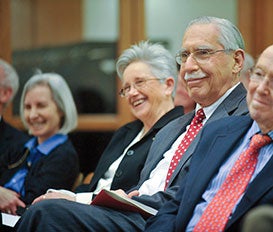In the mid-1990s, Dennis Davis, then a judge of the High Court of Cape Town, sought out HLS Professor Frank Michelman ’60 to advise South African officials on constitutional interpretation. “From that moment on, he became a resource person for us. We regard him as one of ours,” said Davis. “It’s a very, very deep relationship.”
“If we all had listened to Frank, we would be a kinder, gentler nation now.”
Robert Post
In February, Davis was among jurists and scholars who had come from around the world to participate in a tribute to vMichelman as he prepares to retire after nearly half a century on the HLS faculty. The symposium included panels focusing on two of Michelman’s signal achievements: his comparative constitutional law work, which has involved him in an ongoing dialogue with South African jurists over the country’s post-apartheid constitution, and his scholarship on law and philosophy. Participants’ reflections revealed a glimpse of Michelman’s global influence, while generating the rigorous discussion for which he is so well-known.
Attendees recounted the troubled history of South Africa and cited the importance of studying other countries’ models, including the United States’, in the formation of its new constitution. According to Professor Karl Klare ’75 of Northeastern University School of Law, who has worked on legal issues in South Africa, “Frank and South Africa bonded” because the country embraced his dreams of socioeconomic justice.
Former Chief Justice of the Constitutional Court of South Africa Sandile Ngcobo LL.M. ’86 accentuated that point later, saying, “Some of his writings about our constitution and the U.S. Constitution have been very important to our country, in particular on socioeconomic rights.”
Arthur Chaskalson, who also served as chief justice of that court, said that Michelman has been in the forefront of intellectual discourse in South Africa on constitutionalism. “South Africa has been a laboratory for issues that have been a peak concern for you,” he said. Acknowledging Michelman’s retirement from HLS, Chaskalson concluded, “But please don’t retire from South Africa.”
Among the symposium participants were some of Michelman’s former students, including Katharine Young LL.M. ’03 S.J.D. ’09, a lecturer at the Australian National University College of Law. “If I’m ever uncertain about how to teach a student,” she recalled in an interview after the event, “I reflect back on memories of him.”
In a panel on law and philosophy, Dean Robert Post of Yale Law School called Michelman’s writing “so wise and perfectly tactful.” Post cited Michelman’s article on “Human Rights and the Limits of Constitutional Theory,” in which he addressed the question of whether human rights require democratic legitimization. Michelman, he said, stood on the side of upholding rights regardless of popular opinion. “If we all had listened to Frank, we would be a kinder, gentler nation now.”
Michael Sandel, professor of government at Harvard University, recalled that when he was a student at Oxford, he sought out work by Michelman which posited that it’s possible to interpret the Constitution through a lens of justice. He called Michelman “a gentle and affectionate sparring partner on questions of law and political philosophy.”
Margaret Jane Radin, a professor at the University of Michigan Law School, praised Michelman’s “reflective equilibrium,” noting his ability to negotiate the challenge of applying philosophy to politics. “This is a unique contribution, one that is without parallel, and truly one that is justly celebrated.”
Justice Rosalie Silberman Abella of the Supreme Court of Canada spoke of the philosophy of judging, noting that the way judges frame an issue determines their choices, and the need for judges to make decisions regardless of public opinion. Turning to Michelman, she noted that he began his HLS teaching career in 1963, the momentous year of Martin Luther King’s “I Have a Dream” speech and John F. Kennedy’s civil rights address. King, she recounted, later spoke of the moral arc of the universe bending toward justice. “I think there is a moral universe you’ve created for the rest of us,” she said.
